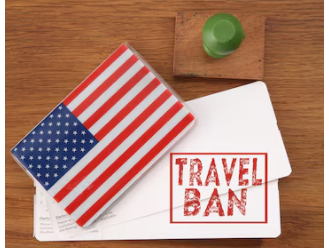International relations and immigration policies are once again at the forefront as the Trump administration prepares to enact a new travel ban in 2025. This ban is more extensive and far-reaching than its predecessors, potentially impacting up to 43 countries. Even though the details are still being worked out, the proposed ban has the potential to drastically alter U.S.-international relations, particularly since it expands on previous limitations imposed during Trump’s first term.
The Countries Affected by Trump’s Proposed 2025 Travel Ban
| Category | Countries Affected |
|---|---|
| Full Visa Suspension | Afghanistan, Iran, Syria, Cuba, North Korea |
| Partial Visa Suspension | Eritrea, Haiti, Laos, Myanmar, South Sudan |
| Probationary Period | Belarus, Pakistan, Turkmenistan, among others (26 countries in total) |
| Potential Impact | Economic and diplomatic implications, especially concerning trade, tourism, and remittance flows from affected nations |
For further information on U.S. travel restrictions, please visit U.S. Department of State , Wikipedia
A More Comprehensive Strategy for National Security
The Extent of the New Travel Ban
The Trump administration’s 2025 proposal seeks to include a wider range of countries, in sharp contrast to the travel bans of his first term, which primarily targeted countries with a majority of Muslims. Three categories—each with a unique set of requirements and implications—have been established for the proposed restrictions.
The most severe category, full visa suspension, applies to ten nations, including well-known ones like Afghanistan, Iran, Syria, Cuba, and North Korea. U.S. visas for citizens of these countries would be completely suspended, preventing them from entering the country for any reason, including study, business, or tourism.
Partial Visa Suspension:
There would be partial visa suspensions for five more nations, including South Sudan, Haiti, Laos, Myanmar, and Eritrea. Tourist and student visas would be the main targets of the suspension, though some groups of people might be exempt.
Probationary Period:
A final group of 26 nations, including Turkmenistan, Pakistan, and Belarus, would be subject to a 60-day probationary period. These nations would have to deal with issues pertaining to security and screening procedures during this period. They may face partial suspensions if they don’t make the required adjustments.
The Secretary of State and other U.S. officials have been instrumental in the development of this comprehensive travel restriction plan, which is currently under review but is anticipated to be finalized soon.
A Comparative Study of the Travel Ban Implemented by the Trump Administration
Trump’s travel ban during his first term, which primarily targeted countries with a majority of Muslims, is already very different from the proposed 2025 ban, which is still being reviewed. After multiple iterations, the initial ban, which was put into effect in 2017, eventually became law despite immediate legal challenges. But this new policy broadens the scope, adding new names like Haiti and Belarus in addition to the nations on the old list.
The requirement for improved security and vetting processes, which has become a key component of the Trump administration’s strategy, is further highlighted by the 2025 ban. Critics contend that adding new nations might be viewed as going too far and that it might target nations more for political reasons than for genuine national security issues.
What This Means for U.S. Relations and the Diplomatic Repercussions
There may be significant diplomatic repercussions as the United States implements this new travel ban. Countries impacted by the ban might reconsider their ties with the United States, particularly if they believe they are being unfairly singled out. New targets like Belarus and Eritrea might adopt a more critical stance on U.S. foreign policy, while nations like Cuba and Venezuela, which already have tense diplomatic relations with the U.S., might become even more isolated.
There may also be serious economic repercussions. Remittances sent home by foreign workers in the United States are vital to many of the impacted countries. Travel restrictions have the potential to seriously upset these financial flows, with repercussions for communities and families that rely on this essential source of income.
Domestic Reactions: The Responses of American Officials and Citizens
Domestic responses to the proposed ban are conflicting, while the international community closely monitors the situation. While some Americans and U.S. officials contend that the new travel restrictions are required to safeguard national security, others believe the action goes too far. Despite the White House’s ongoing emphasis on “vetting and screening” travelers to reduce risks, the policy’s implementation could further polarize the nation.
Finalizing the list of impacted nations is currently the responsibility of the State Department, which is headed by Secretary Marco Rubio. A great deal of coordination with other government agencies, such as the National Intelligence Directorate and Homeland Security, is required for this. U.S. officials are still working to finalize the policy, even though the initial implementation deadline has passed.

